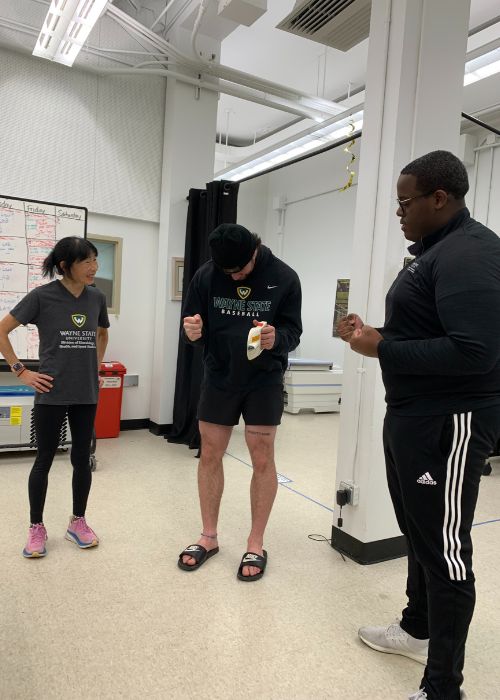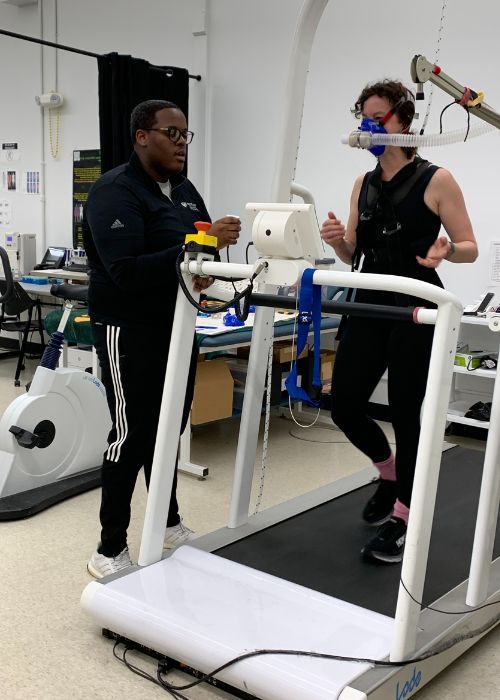Aspiring physician finds mentorship and connections to future career as a student researcher in College of Education’s exercise physiology lab
Research indicates people of color have better health outcomes when their primary care providers look like them. Yet, according to the National Medicine Association, less than 6% of physicians in the United States are Black.
Mark Grove II said his early positive experiences with his primary care physician sparked his interest in medicine. A recommendation from his mother’s co-worker led him to Wayne State.
“He said I could ‘get a great education right in my backyard,’” said Grove, who worked for a real estate investor after graduating from Belleville High School.
Grove, a student in the Wayne State University Mike Ilitch School of Business, originally planned to major in nursing, but unsolicited advice from a random stranger prompted him to select a less traditional major for an aspiring medical student: management.
Grove said, “When I attended Admitted Student Day, this person asked, ‘Are you interested in going to med school? You don’t need to be a nursing major. Pick something outside of the box.’ Since I was already working in the finance space, I figured, why not study management and try to be more well-rounded?”
Last summer, Grove set out to obtain research experience. Using the confidence and cold-calling skill he developed working in real estate, he contacted several faculty members.
“I wanted to find research that interested me and a lab where I could be involved and make a difference,” he said. “I visited school and college websites, picked departments that interested me and went professor by professor.”
Dr. Tamara Hew-Butler, a podiatric physician and associate professor of exercise and sports science in the Wayne State University College of Education, was the only one who responded. She welcomed Grove into the Exercise Physiology Lab, where individuals and athletes learn to enhance their athletic performance and prevent injury and disease.
“Students give up their own time,” said Hew-Butler. “We screen them to make sure we have consistent help. My goal is to show them knowledge is not passive, where we just feed it to them, they regurgitate it, then they pass a test. At an R1 research institution like Wayne State, we should create knowledge.”
Launched just before the COVID-19 pandemic, the 10,000 Warriors Project is an extensive study focusing on various health metrics.

“Everyone in the lab works on this project,” said Hew-Butler. “They learn how to facilitate all the tests. One of the metrics we measure is handgrip strength. Mark was good at it, so he became a handgrip specialist.”
While measuring handgrip strength seems simple, results have profound implications for overall health. Previous studies revealed links between grip strength and numerous health conditions — including high blood pressure, diabetes and dementia — among older individuals. Grove and Hew-Butler hope to add new research insights by exploring handgrip strength among college students.
“We explore nuances of factors affecting hand grip that are not straightforward,” said Hew-Butler. “It combines the messiness that's going to be medicine with the science that we don't know everything.”
Grove discovered more than he anticipated in Hew-Butler, who not only became a mentor but also opened the door to an Undergraduate Research Opportunities Program (UROP) fellowship.
“When I saw the fellowship application, it made sense to build on data we’d collected as Mark’s project,” said Hew-Butler. “I know Mark wants to be a doctor. Conducting research and presenting and publishing it will help him get to the next step. He will be at the forefront of evidence-based medicine because he will understand how to create knowledge and solutions.”
Grove and Hew-Butler were excited to learn he is one of seven students — and the only one from a lab in the College of Education — selected to present their work at the National Council on Undergraduate Research Conference in Long Beach, California, this April. The university will cover his travel, accommodations and registration.
“To learn I was one of the few selected felt like all the hard work I had been putting in finally paid off,” Grove said. “I am excited, grateful and thankful to the university and everyone who helped make this possible.”
“You're always excited when your students do well,” said Hew-Butler. “I'm so proud Mark has a chance to go to a national conference, present our research and represent Wayne State.”

The pair agree that working in a research lab and participating in initiatives like UROP help students develop transferable skills they can use in any career. Studying issues that address real-world health challenges allows Grove to explore his interest medicine; develop knowledge and skills he will use as a medical student and physician; and connect with others who may become future mentors, research partners, or employers. This aligns with Wayne State’s College to Career initiative, which seeks to provide all students with experiential learning opportunities that allow them to encounter the world, gain deeper insights and new perspectives and prepare for prosperous careers.
“Research teaches students to become detail-oriented, synthesize information and think critically — like what does this mean and how can we use it practically?” said Hew-Butler. “It teaches them public speaking and networking skills, connects them with other students and faculty from Wayne State and other universities and allows them to share their ideas. It gives them the tools to explore real-world issues and challenges in a scientific way.”
“Working in the lab helps students adjust to different environments and work in teams,” Grove added. “It also teaches you to adapt and fill whatever roles are needed.”
Grove’s experience underscores the vital role mentorship and involvement in practical research experiences play in developing future healthcare leaders.
“My first two or three years at Wayne State, I didn't really have any sense of direction,” said Grove. “Coursework is 50% of going to college, and the other 50% includes the connections you make, network you build and opportunities you find. It all came together once I reached out to Tami, who can give me direction and expose me to opportunities to put myself in the best position possible so I can make progress toward my career.”
Hew-Butler believes providing students of color with opportunities not only helps eliminate some barriers they may face getting to medical school but also benefits the lab and its researchers.
“Working in a research lab is also a social experiment,” she said. “Working with people who are different from you adds so much richness to life and the lab and shows initiative, leadership and an ability to collaborate and communicate. The culture we try to build here is fun and family oriented. Most students are studying kinesiology. When Mark came, I thought it would be fun to have a business student because he adds a different perspective. Variety is the spice of life.”
by Darlene A. White and Tracy Boyce